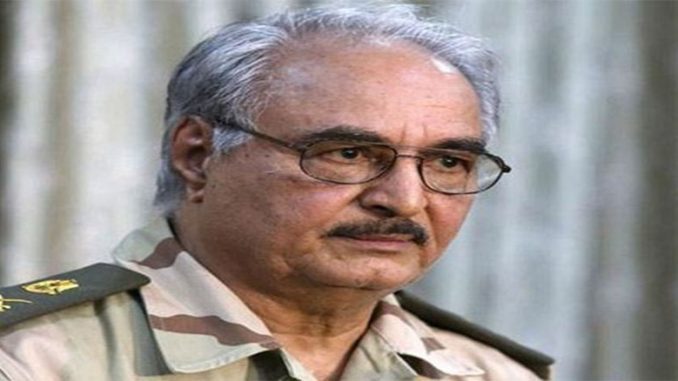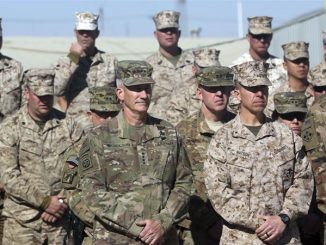
Thousands of people poured onto the streets of Libya’s conflict-hit capital, urging the U.N. to stop foreign intervention after U.S. President Donald Trump voiced support for commander Khalifa Haftar.
In an apparent reversal of U.S. policy on Libya, President Trump spoke by phone with Haftar, who is leading an offensive to take over the capital of Tripoli, the seat of the U.N.-backed Government of National Accord (GNA). The White House said on Friday that President Donald Trump spoke by phone earlier in the week and discussed “ongoing counterterrorism efforts” with Haftar. A White House statement said that in the phone call on Monday, Trump “recognized Field Marshal Haftar’s significant role in fighting terrorism and securing Libya’s oil resources, and the two discussed a shared vision for Libya’s transition to a stable, democratic political system.” It was unclear why the White House waited several days to announce the phone call. Haftar is aligned with a rival government in the east that is supported by Trump’s allies Egypt and the United Arab Emirates (UAE).
Intermittent fighting near Tripoli has left scores of people dead. On Saturday, heavy clashes broke out in the southern districts of Tripoli, as forces loyal to the country’s U.N.-recognized government launched a counterattack to repel fighters allied to Haftar. More than 30,000 people have been displaced due to fighting near the Libyan capital, Tripoli, which has been raging since the beginning of the month, the World Health Organization (WHO) said. The U.N. agency wrote on Twitter yesterday that at least 227 people have been killed and more than 1,125 injured in the violence.
Since April 4, Haftar’s forces have sought to take control of Tripoli as part of a military campaign to capture the Libyan capital from the Tripoli government. Haftar’s push on Tripoli in Libya’s northwest is the latest turn in a cycle of factional violence and chaos dating back to the ouster of former President Moammar Gadhafi in 2011 and NATO’s aerial operations. Libya has remained dogged by turmoil since 2011 when a NATO-backed uprising led to the ouster and death of former President Gadhafi after more than four decades in power. Since then, Libya’s stark political divisions have yielded two rival seats of power, one in Tobruk and another in Tripoli, and a host of heavily armed militia groups. Haftar is not recognized by the international community, as the elected parliament of the country is centered in Tripoli. However, Haftar, with financial and political support from certain countries, including some Gulf States, is an influential actor in the war-torn country.



